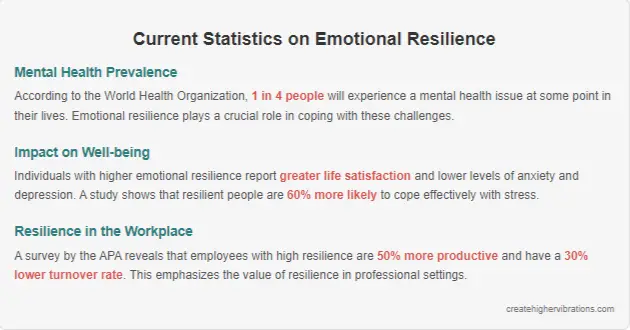10 Ways To Build Emotional Resilience Quickly Through Adversity

Ever felt like life’s challenges are piling up, one after another? We’ve all been there. Tough times are inevitable. These moments happen. It could be losing a loved one. It might be facing a tough break-up. Or, it could just be spilling orange juice into your cereal instead of milk.
But here’s the good news: we can choose how we respond. We can let setbacks knock us down, or we can bounce back stronger than before. That’s where emotional resilience comes in.
In this article, I’ll share 10 practical ways to build emotional resilience. Together, we’ll explore how to navigate adversity, strengthen our inner selves, and find meaning even in the toughest situations.
Let’s dive in and start turning challenges into opportunities for growth.

Understanding Emotional Resilience
Before we jump into the tips, let’s understand what emotional resilience means. Emotional resilience is the ability to adapt to stressful situations and bounce back from adversity.
It’s not just about surviving tough times but thriving despite them. Resilient people don’t let setbacks define them. Instead, they see challenges as opportunities to grow and learn.
Resilience isn’t a trait we’re born with; it’s something we can develop over time. Just like building muscles, we can strengthen our resilience through practice and perseverance.
Research shows that emotional resiliency is key to building a better quality of life. It helps us cope with stress effectively, handle difficult emotions, and maintain a positive outlook.
Why Is Emotional Resilience Important?
Life’s challenges are unavoidable. But by building our emotional resilience, we empower ourselves to perceive adversities differently. We gain the ability to manage stress and bounce back quicker from setbacks.
Resilient individuals often feel a greater sense of control over their lives. They have a realistic view of the world and an inner strength that helps them navigate through hardships.
Can Anyone Become More Resilient?
Absolutely! Resilience isn’t something only a few possess. It’s a skill we can all develop and strengthen. Whether you’re dealing with low resilience now or just want to enhance what you already have. These tips can help you become more resilient over time.
Subscribe to Create Higher Vibrations!
Get Inspiration and Practical advice straight to your inbox.
10 Ways To Build Emotional Resilience
Let’s reveal how to build emotional resilience:
1. Be Proactive
One of the key traits of resilient people is their proactive approach to life’s challenges. Instead of waiting for problems to fix themselves, they take immediate action.
When adversity strikes, ask yourself: “What can I do right now to improve the situation?” By focusing on actionable steps, we shift our energy from feeling helpless to feeling empowered.
Being proactive also means anticipating potential obstacles and preparing for them. It’s about taking charge of our lives and not letting external circumstances dictate our happiness. Resilience refers to our ability to adapt and act, even when things get tough.
How to Cultivate Proactivity
By taking control and acting proactively, we build our resilience and become better equipped to handle future challenges.
2. Protect Your Downtime
Resilient people understand the importance of rest. They know that to cope with a difficult situation effectively, they need to recharge their mind and body. Protecting your downtime isn’t a luxury; it’s a necessity for building emotional resilience.
Why Downtime Matters
When we’re constantly on the go, our stress levels increase, and our ability to handle adversity decreases. By setting aside time for ourselves, we reduce stress resilience and improve our overall well-being. This downtime allows us to reflect, process our emotions, and prepare mentally for whatever comes next.
Ways to Protect Your Downtime
By making downtime a non-negotiable part of your routine, you’ll find you’re more resilient when facing life’s challenges.
3. Change Your Mindset About Adversity
Our perspective on adversity can either hinder or enhance our resilience. Instead of viewing challenges as insurmountable problems, see them as opportunities for growth. This mindset shift is key to building emotional resilience.
Embracing a Growth Mindset
Resilient individuals often have a growth mindset. They believe that challenges help them learn and evolve. When faced with a setback, ask yourself: “What can I learn from this experience?” This question redirects your focus from the negative aspects to potential positive outcomes.
Benefits of a Positive Mindset
Remember, adversity is a part of life. By changing how we perceive it, we can find meaning and even appreciation in the face of difficulties.
4. Build Strong Relationships
No one can navigate life’s challenges alone. Building strong, supportive relationships is crucial for emotional resilience. Social support provides us with a safety net during tough times.
The Role of Social Support
Having people to turn to helps us cope with stress and bounce back from setbacks. Friends and family can offer different perspectives, advice, or simply a listening ear. Emotionally resilient people often have a network they can rely on.
Tips to Build and Maintain Relationships
By nurturing relationships, we create a support system that enhances our ability to handle adversity.

5. Focus on the Present
Dwelling on the past or worrying about the future can drain our energy and hinder resilience. By focusing on the present moment, we can better manage our emotions and reactions.
Practicing Mindfulness
Mindfulness is the practice of being fully engaged in the here and now. It helps us become more aware of our thoughts and feelings without judgment. This awareness allows us to respond to situations thoughtfully rather than reactively.
How to Stay Present
By concentrating on the present, we reduce anxiety and increase our resilience in stressful situations.
6. Accept That Life Isn’t Fair
Understanding that life isn’t always fair can be a liberating realization. Accepting this truth allows us to let go of unrealistic expectations and focus on what we can control.
Embracing Reality
Resilient people recognize that everyone faces hardships. By accepting that adversity is a part of life, we stop wasting energy on the “why me?” mentality. Instead, we channel that energy into overcoming the challenges we face.
How Acceptance Builds Resilience
Remember, while we can’t control everything that happens, we can control how we respond.
7. Stay Flexible
Flexibility is a cornerstone of emotional resilience. Being rigid in our thoughts and plans can make it harder to adapt when things don’t go as expected.
Adapting to Change
Life is full of unexpected twists and turns. Resilient individuals stay open to new ideas and ways of doing things. They understand that flexibility allows them to navigate obstacles more effectively.
Tips for Staying Flexible
By staying flexible, we can handle setbacks without feeling derailed.
8. Focus on What You Can Change
It’s easy to feel overwhelmed when faced with challenges beyond our control. Focusing on what we can change empowers us and boosts our resilience.
Taking Control
Resilient people concentrate on actions within their power. They don’t waste time blaming external factors. Instead, they look for ways they can make a difference in their own lives.
Steps to Focus Your Energy
By directing our efforts where they matter most, we enhance our ability to cope with stress.

9. Practice Gratitude
Gratitude is a powerful tool for building emotional resilience. Focusing on what we’re thankful for shifts our mindset from negative to positive.
The Impact of Gratitude
Practicing gratitude can improve mental health, reduce stress, and increase happiness. It helps us recognize the good in our lives, even during tough times.
How to Cultivate Gratitude
By making gratitude a habit, we strengthen our resilience and overall well-being.
10. Embrace Challenges
Facing challenges head-on is a practical way to build resilience. By stepping out of our comfort zones, we learn to handle adversity more effectively.
Seeking Growth Opportunities
Taking on new challenges helps us develop coping mechanisms and build confidence. These experiences teach us that we can handle more than we thought. It could be learning a new skill. It might be taking cold showers. It could also be setting ambitious goals.
Ways to Embrace Challenges
By embracing challenges, we become more resilient and better prepared for future adversities.
Final Takeaway
Building emotional resilience isn’t an overnight process. It’s a journey of self-discovery, growth, and continuous practice. By implementing these 10 strategies, we can develop the inner strength needed to navigate life’s ups and downs. Remember, resilience means not just surviving adversity but thriving because of it.
So let’s start today. Let’s empower ourselves to perceive adversities differently, cope with stress effectively, and keep evolving through the pain. Together, we can become more emotionally resilient and enjoy a better quality of life.
Ready to build your emotional resilience? Begin by choosing one tip from this list and put it into action this week. You’ll be amazed at the difference it can make.



